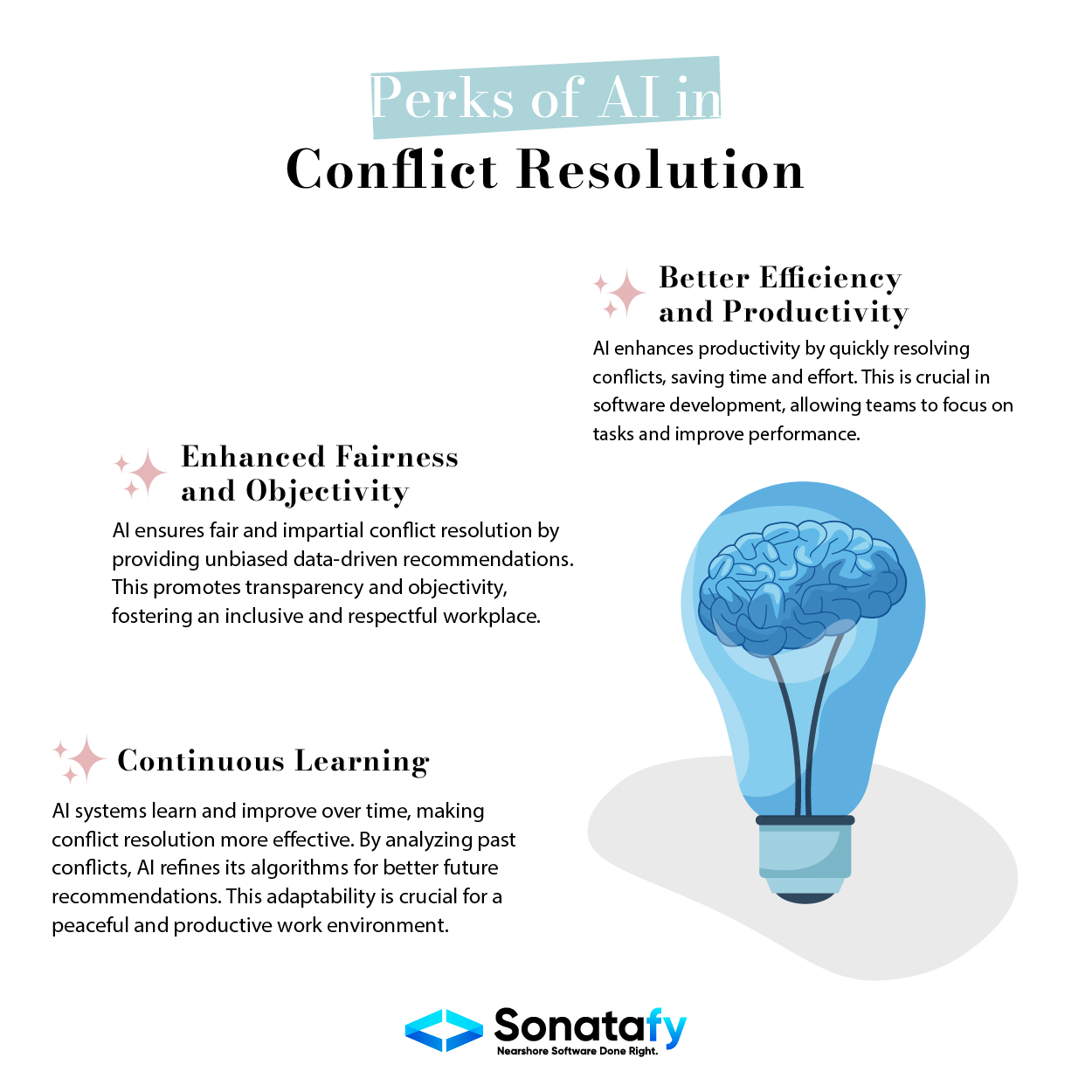Resolving conflicts is vital for fostering a productive and enjoyable workplace, particularly in fast-paced industries like software development. Artificial Intelligence (AI) has the potential to revolutionize conflict resolution by introducing new methods that enhance efficiency, fairness, and team dynamics. In this article, we’ll explore how AI can aid in conflict resolution and discuss its advantages and disadvantages.
AI in Conflict Resolution
I think AI can play a big part in resolving conflicts in lots of different ways. It can predict things, understand languages naturally, and even help with mediating. Companies can use these technologies to handle concerns before they become significant problems, improve how employees interact with each other, and make workplaces more open and empathetic.
Predicting Conflicts in Advance
I believe AI is essential in conflict resolution and especially in predictive data analysis. AI can identify how people communicate before potential problems arise and analyze project schedules and team dynamics. This method is crucial in software development, where deadlines are strict and everyone is under a lot of stress.
Predictive data analytics can help managers see why disagreements happen, like when employees are stressed, misunderstand each other, or have conflicting strategies. If we deal with these problems early, we can prevent them from causing trouble and keep productivity up. In my experience, this creates a more chill work environment and leads to better project results.
Better Communication Using NLP
Communication is key to resolving conflicts. I believe AI, especially natural language processing (NLP), can greatly improve how teams talk and understand each other. NLP helps AI systems analyze and understand human speech, revealing the tone, emotion, and intentions behind messages.
In conflict resolution, NLP can help managers intervene quickly and resolve situations before they escalate. In my opinion, this not only helps resolve conflicts but also creates an open and transparent workplace culture.
Automated Mediation Tools
There’s something incredible happening in the field of AI for dealing with conflicts. There are new mediation tools that use AI to help people with disagreements discuss and find a solution that works for both parties. I think this can be really useful in software development, especially when many teams work remotely and in different locations.
Automated systems can lead people through step-by-step mediation processes, asking the right questions and offering possible solutions. I believe this not only accelerates the resolution process but also ensures that everyone is heard and understood. AI can help reduce bias and promote fair decision-making by providing a neutral platform for conflict resolution.
Enhancing Human Mediators with AI
Even though AI has some amazing tools and abilities, I think it’s important to highlight that AI should complement, not replace, human mediators. The personal touch is vital in conflict resolution, but AI may help human mediators by providing the right insights and tools to be more effective.
Decision Support Systems
AI-powered decision support systems can help mediators by providing data-driven recommendations and possible solutions based on historical data and prediction models. In my opinion, this allows mediators to make better decisions and develop successful solutions.
Training and Development
AI can help train mediators by simulating different conflict scenarios. This allows people to practice and improve their skills in a controlled setting, which is very useful in solving real problems.
Perks of AI in Conflict Resolution
I think that adding artificial intelligence to conflict resolution strategies could be very useful. In my opinion, these benefits are important in the software development industry, where collaboration is essential to success.

Better Efficiency and Productivity
I believe one of the biggest benefits of using AI for conflict resolution is increased productivity. By spotting and resolving disagreements early, teams can avoid long disputes that disrupt work. AI solutions also make the resolution process more efficient, saving time and effort.
In software development, where deadlines are tight, efficiency can make a huge difference. This allows teams to focus on their tasks rather than individual issues, leading to greater results and overall performance.
Enhanced Fairness and Objectivity
AI is also helpful in making the conflict resolution process fair and impartial. People can have personal biases or be drawn to their emotions, while AI systems can provide unbiased analytics and recommendations based on data and predefined algorithms.
I think it’s crucial to resolve issues fairly and objectively, and AI can help. When people from different backgrounds work together, misunderstandings can happen. Promoting transparency and objectivity in conflict resolution can create a more inclusive and respectful workplace.
Continuous Learning
AI systems are designed to learn and improve with time. I think this is especially helpful for resolving conflicts since each one is unique and can always be improved. By studying past conflicts and how they were resolved, AI systems can refine their algorithms and make better predictions and recommendations in the future.
This constant learning process keeps AI conflict resolution tools effective and up-to-date, adapting to changes in the software development industry. I believe adaptation is critical for maintaining a peaceful and productive work environment.
Challenges and Considerations
I think AI has great potential for conflict resolution, but we must consider its challenges. Ensuring it’s ethical, protecting data, and managing people are all important.
Ethical Concerns and Bias
When using AI to resolve conflicts, we must consider ethics and biases. AI systems are only as good as the data they learn from. If the data is flawed, the AI’s suggestions might be too. We need to train AI on diverse data to reduce these risks.
I think it’s important to consider the ethics of using AI in conflict resolution. We need clear rules to ensure AI is used responsibly and fairly, with a focus on transparency.
Data Privacy
AI systems used in conflict resolution may need to access sensitive info like communication logs and personal data. It is critical to have strong security measures established to protect this data and ensure its proper use.
Companies also need to be transparent about how data is collected, protected, and used and ensure their employees understand their rights and options. I truly believe honesty is essential for gaining trust and belief in AI-powered conflict resolution tools.
The Need for Human Oversight
AI can really help with sorting out conflicts, but we gotta have humans overseeing it. AI can offer some good ideas, but at the end of the day, a human mediator should make the final call. It is critical to consider all of the specific details and complexities of each concern to ensure thoughtful and understanding results.
I believe using AI to augment, rather than replace, what humans can achieve is the best way to go. The combination of AI and human judgment allows companies to find better solutions to problems.
Conclusion
AI has the potential to transform conflict resolution in software development. By leveraging predictive analytics, natural language processing, and automated mediation technologies, companies can prevent conflicts, enhance communication, and ensure fairness and objectivity. While adopting AI comes with challenges, careful implementation and management can overcome these hurdles.
For AI-driven conflict resolution to be effective, it is crucial that every team member feels valued and included. When a software company fully embraces AI, it can achieve greater efficiency, effectiveness, and success.




